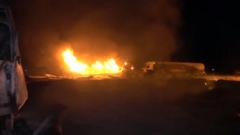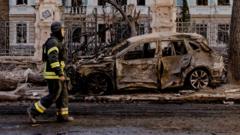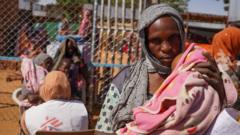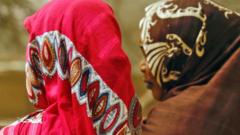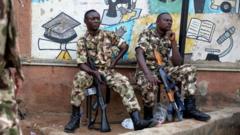The recent attack on the Zamzam camp in Sudan has forced thousands into perilous flights toward safety, each carrying their own harrowing tales of loss and survival. Among them is Fathiya Mohammed, who recounts the challenges faced while escaping with her children. With infrastructure overwhelmed, medical assistance is desperately needed, highlighting the urgent humanitarian crisis in the region.
The Tragic Exodus from Zamzam: A Mother’s Fight for Survival in Sudan
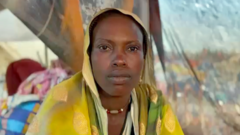
The Tragic Exodus from Zamzam: A Mother’s Fight for Survival in Sudan
As conflict escalates in Sudan, the plight of internally displaced people from the Zamzam camp reveals the grim realities of war and the desperate search for safety.
In a heart-wrenching account of survival, Fathiya Mohammed, a mother of two, shared her experience fleeing the Zamzam camp in Sudan following a violent assault by paramilitary forces. The camp, home to 700,000 displaced individuals already grappling with extreme poverty, was decimated in a recent attack that has left many without shelter or basic necessities.
For over two decades, the Darfur region has been marred by conflict, escalating when a civil war ignited across Sudan two years ago. Those who sought refuge in Zamzam after losing their homes to earlier bouts of violence found their lives shattered yet again as the camp was invaded by the Rapid Support Forces (RSF), which aim to gain control of the nearby city of el-Fasher. Despite the RSF denying reports of atrocities, they did confirm their takeover of the camp, a revelation that led North Darfur's Health Minister Ibrahim Khater to label Zamzam as “completely destroyed.”
Fathiya’s journey to the town of Tawila was harrowing. Walking barefoot over four days with her children—one on her back and the other in her arms—she faced not just the brutality of uncertainty but also the dangers from thieves during her escape. Having lost her husband in the chaos, her future remains uncertain.
“I have nothing left,” lamented Saadiya Adam, another camp resident who watched her home and livestock consumed by flames. She, like many others, was left with only the clothes on her back while embarking on a perilous journey to safety.
The influx of thousands into Tawila has overwhelmed local medical facilities. Non-governmental organization Doctors Without Borders (MSF) reported that in just two days, over 20,000 newly displaced individuals sought treatment at their hospital. "The injuries are becoming routine," observed head nurse Tiphaine Salmon, detailing the overwhelming number of gunshot victims, including children.
The RSF's actions in and around Zamzam have prompted fears of an ongoing humanitarian disaster, compounded by the broader struggle for power in Sudan amidst a backdrop of military turmoil. As the RSF seeks to establish a rival government in territories they control, the specter of further division looms, already evident in the experiences shared by survivors like Fathiya.
In a plea for peace, she reflected on the losses endured, voicing a desire for an end to the violence: “We want the war to stop. Peace is the most important thing.” As the situation unfolds, the world watches with a growing sense of urgency for a resolution to the crisis engulfing Sudan.





